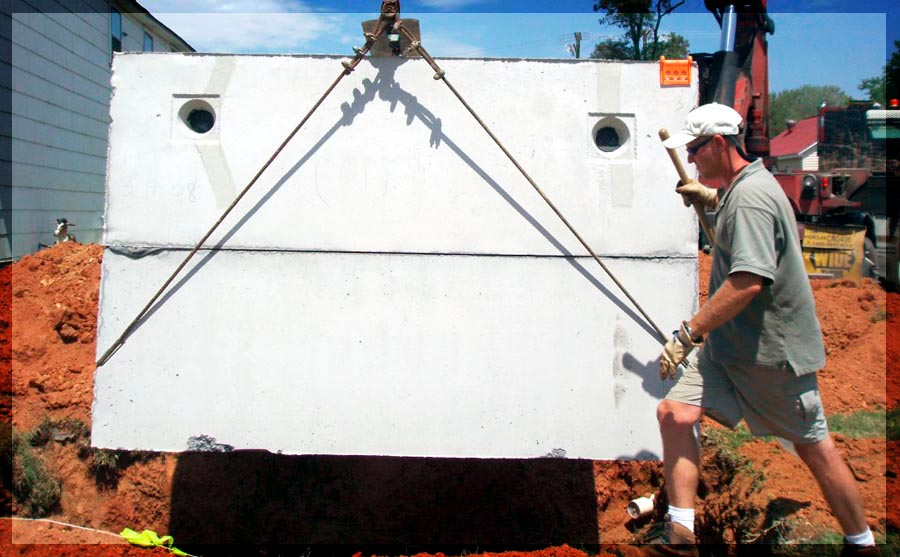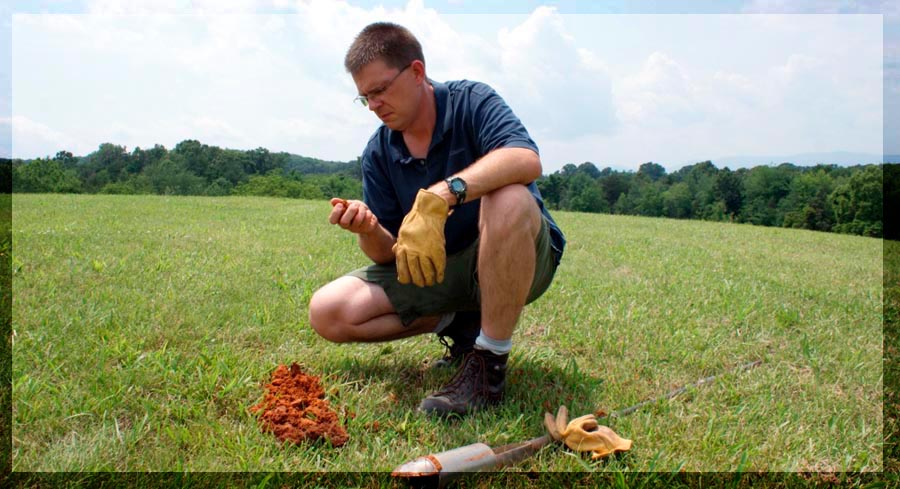|
What We Do
Because
Tom is trained and gained most of his experience within the
Health Department, he is familiar with VDH's regulations, policies,
and procedures throughout the State of Virginia. Also, because
he is an experienced geologist, he has a good understanding
of the environmental impacts and issues inherent in constructing
septic and well systems.
Below is a list of our services from the most basic to the most
comprehensive:
|
|
Drainfield and Well Placement
BRSC specializes in performing site and soil evaluations,
verifying that properties meet the Sewage
Handling and Disposal Regulations for the installation
of sewage disposal systems (drainfields). We examine
the landscape and soil conditions, and if they are suitable,
we design a septic system that will handle the number
of bedrooms for which the homeowner is applying.
We
mark the corners of the proposed drainfield with clearly
labeled wooden stakes, so that they can be easily identified
by surveyors, the Health Department, the homeowner,
and the septic contractor. Another service we provide
is identifying an area where a well can be drilled.
We will ensure that the area meets all the requirements
in the Private
Well Regulations as well as any additional requirements
contained in the Sewage Handling and Disposal Regulations.
|
|
Feasibility
Studies
For a Feasibility Study, we stake out the proposed drainfield
site and write a letter of opinion, stating whether
or not the property meets the minimum requirements of
the sewage regulations. This is helpful if you want
to quickly find out if a property "percs,"
without having to go through an involved process of
applying for permits, paying agency fees, hiring surveyors,
etc.
|
|
|
|
Certification
Letters
A
surveyor is hired to locate our proposed drain field
area onto a plat of the property. This is then used
to produce a formal report that can be taken to the
Health Department for approval. A Health Department
certification letter based on our report guarantees
that some type of septic system can be approved for
that property, as long as site conditions do not
substantially change. A certification letter never expires,
and it is transferable from owner to owner.
|
|
Septic
and Well Permits.
BRSC
is highly qualified and experienced in performing septic
and well permits. The Health Department requires a thorough
report from an AOSE in order to approve a septic and/or
well permit. Most importantly, the report must include
a scaled drawing that shows the exact location of the
proposed house, drainfield, well (if the homeowner is
not connecting to public water), and any planned accessory
structures. A permit package must also include all of
the soil descriptions, construction specifications,
abbreviated design for the septic system, and an application
page. Tom has done hundreds of septic permits, so he
has the experience and know-how to get the
job.
|
|
Subdivision Planning
Any time someone needs to divide a piece of property,
they are required to hire a licensed soil evaluator
(such as us). This is now true for family divisions,
as well as multiple lot subdivisions. BRSC has a good
rapport with most of the local surveyors, because they
know that our drainfield areas are always clearly marked,
and that we are prompt with our paperwork. That is exactly
why many surveyors in the area recommend us to their
clients when they are working on a subdivision.
|
|
Alternative Septic Design:
Anyone
who has bought or sold land in the past five to ten
years has noticed the same trend: good land is hard
to come by and it is getting more difficult to find
property where you can install a conventional septic
system. While we always go out of our way to find conventional
systems for our clients, some properties have site and/or
soil conditions that simply make that impossible. If
a property does not "perc" for a conventional
system, we always determine what type of system the
property will require while we are in the field, in
order to give our clients a good idea of what they can
expect to pay for the system.
Some alternative systems are actually very simple and
only require an extra treatment unit installed after
the septic tank, with a drain field that consists of
shallow placed trenches. We are able to do permits for
these types of systems. Other lots, however, have more
limiting soils and/or site conditions, and require systems
that only a licensed Professional Engineer (P.E.) can
design. Since we are familiar with all types of alternative
systems, we can do the leg work in the field to lay
out the area necessary for any system and then if necessary,
consult with P.E. in order to complete the permit.

|
|
|

When Tom worked for VDH, repair permits were among his
highest priorities, and he has a great deal of experience
doing them. When BRSC does a repair permit, we understand
that we are working with someone who is in a very bad
situation, who needs our help to get the problem solved
quickly, in the most affordable way possible. As VDH
becomes less involved with the septic permitting process
in the future, it is BRSC's pledge to always help people
with failing drain fields, by offering our professional
services at a reduced price. We will schedule your work
promptly and produce your required paperwork as quickly
as possible, in order to get your system fixed.
In addition, we offer you our years of experience troubleshooting
failing drain fields. There is no need, for instance,
to replace an entire drain field if it is not really
failing. Many times, sewage may be coming to the ground
because of a broken pipe or an improperly leveled distribution
box. Pipes may be clogged, or a pump may be malfunctioning.
BRSC has the knowledge and experience it takes to realize
when these problems might be occurring, and to best
direct you as to how to get them fixed.
|
|
|
|
Using a hand auger, BRSC evaluates the
soil beneath the proposed house foundation. Many times
we find that a simple field examination can rule out
the presence of shrink swell soils, and we can quickly
write a letter that will allow you to proceed with getting
your building permit.
If, however, we suspect that the soil may have shrink
swell characteristics, we will take a sample and send
it to a laboratory. We then incorporate the lab results
into a soil report. If the soil does not have shrink
swell tendencies, the homeowner has no worries. If the
soil is found to have moderate or high shrink swell
characteristics, we recommend that the homeowner use
a Professional Engineer to design reinforced footings
that will withstand the forces of the shrinking and
expanding soil.
|
|
Septic
Inspections / Walkovers
BRSC
has tons of experience inspecting septic systems. When
we do a septic permit, we are responsible for inspecting
the drain field, to ensure that the contractor has installed
it correctly; that is, according to the details of the
permit. We pride ourselves on being available when contractors
call us for an inspection. Our goal is to make it to
the site as quickly as possible so that the contractor
can get the finished drain field covered up. Additionally,
we are looking out for our clients, to make sure that
the system will function for many years to come.
|
|
|
|
|
|
|
|
|
|
|
When it comes to septic walkovers, we
offer our years of experience in looking at existing
septic systems. We can perform a thorough examination
of a septic system to determine whether the system is
working properly, along with a records review at the
Health Department, to make sure there are no issues
with a system before a property is sold.
|
|
|
|
|
BACK TO TOP OF PAGE
|
|

